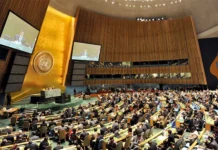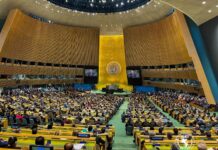Two dozen African leaders have urged wealthier nations to keep their aid pledges so that the continent can address climate change effects for which it bears little responsibility.
African ministers issued the call in a communique on Friday, at the end of a three-day forum in Cairo, Egypt’s capital, and two months before Egypt hosts the crucial COP27 climate conference in Sharm El-Sheikh in November.
In a closing statement, the 24 leaders urged “developed countries to fulfill their pledges in relation to climate and development finance, and to deliver on their commitments to double adaptation finance, particularly to Africa.”
According to former UN Secretary-General Ban Ki-moon, the African continent emits only about 3% of global CO2 emissions.
Despite this, African countries are among the most vulnerable to the effects of climate change, particularly worsening droughts and floods.
The financial assistance was requested by African leaders due to the “disproportionate impact of climate change and natural loss on the African continent.”
They claimed that Africa not only has a “low carbon footprint,” but also plays an important role in capturing greenhouse gases, particularly in the Congo Basin, which is home to the world’s second-largest tropical rainforest after the Amazon.
‘Rapid withdrawals from fossil fuels’
The communique urged rich countries to meet and expand climate pledges, while poor countries should be able to develop economically while receiving more funds to adapt to climate change effects.
The document emphasized “the need to avoid approaches that encourage abrupt withdrawals from fossil fuels, as this will… jeopardize Africa’s development.”
The role of gas in the transition to cleaner energy is expected to be a hot topic at COP27. Climate activists argue that it should be phased out quickly and replaced with renewables.
Nigerian finance minister Zainab Ahmed, on the other hand, told the Cairo forum that gas was a matter of survival for her country.
“If we don’t get reasonably priced finance to develop gas, we’re denying our citizens the opportunity to achieve basic development,” she said.
The communique also called for a review of multilateral development banks and international financial institutions to prioritize climate change. It proposed the establishment of a sustainable sovereign debt hub to lower the cost of capital for developing countries and to facilitate debt-for-nature swaps.
According to the African Development Bank, the continent will require up to $1.6 trillion between 2020 and 2030 for its own efforts to limit climate change and adapt to the already-observed negative effects.


















